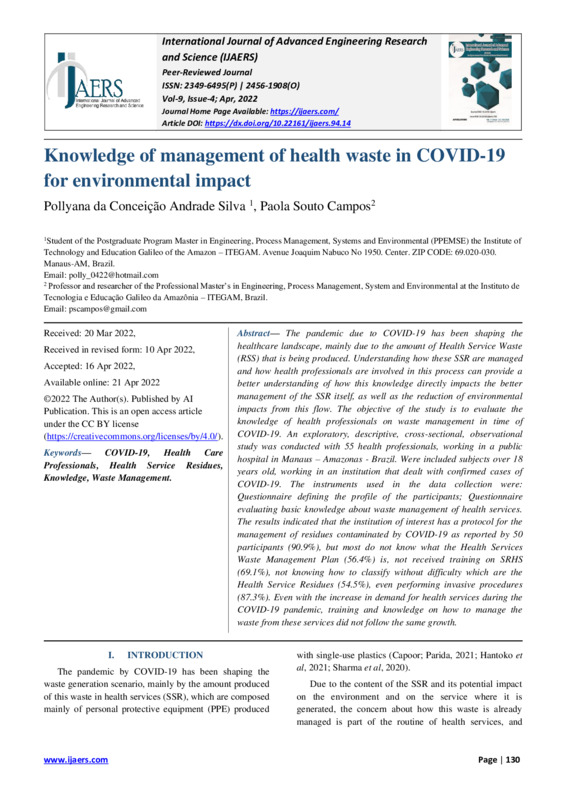KNOWLEDGE OF MANAGEMENT OF HEALTH WASTE IN COVID-19 FOR ENVIRONMENTAL IMPACT
Item
-
Tipo do ITEM
-
Artigo Ciêntifico
-
Título do Artigo
-
KNOWLEDGE OF MANAGEMENT OF HEALTH WASTE IN COVID-19 FOR ENVIRONMENTAL IMPACT
-
Descrição
-
The pandemic due to COVID-19 has been shaping the
healthcare landscape, mainly due to the amount of Health Service Waste
(RSS) that is being produced. Understanding how these SSR are managed
and how health professionals are involved in this process can provide a
better understanding of how this knowledge directly impacts the better
management of the SSR itself, as well as the reduction of environmental
impacts from this flow. The objective of the study is to evaluate the
knowledge of health professionals on waste management in time of
COVID-19. An exploratory, descriptive, cross-sectional, observational
study was conducted with 55 health professionals, working in a public
hospital in Manaus – Amazonas - Brazil. Were included subjects over 18
years old, working in an institution that dealt with confirmed cases of
COVID-19. The instruments used in the data collection were:
Questionnaire defining the profile of the participants; Questionnaire
evaluating basic knowledge about waste management of health services.
The results indicated that the institution of interest has a protocol for the
management of residues contaminated by COVID-19 as reported by 50
participants (90.9%), but most do not know what the Health Services
Waste Management Plan (56.4%) is, not received training on SRHS
(69.1%), not knowing how to classify without difficulty which are the
Health Service Residues (54.5%), even performing invasive procedures
(87.3%). Even with the increase in demand for health services during the
COVID-19 pandemic, training and knowledge on how to manage the
waste from these services did not follow the same growth
-
Abstract
-
The pandemic due to COVID-19 has been shaping the
healthcare landscape, mainly due to the amount of Health Service Waste
(RSS) that is being produced. Understanding how these SSR are managed
and how health professionals are involved in this process can provide a
better understanding of how this knowledge directly impacts the better
management of the SSR itself, as well as the reduction of environmental
impacts from this flow. The objective of the study is to evaluate the
knowledge of health professionals on waste management in time of
COVID-19. An exploratory, descriptive, cross-sectional, observational
study was conducted with 55 health professionals, working in a public
hospital in Manaus – Amazonas - Brazil. Were included subjects over 18
years old, working in an institution that dealt with confirmed cases of
COVID-19. The instruments used in the data collection were:
Questionnaire defining the profile of the participants; Questionnaire
evaluating basic knowledge about waste management of health services.
The results indicated that the institution of interest has a protocol for the
management of residues contaminated by COVID-19 as reported by 50
participants (90.9%), but most do not know what the Health Services
Waste Management Plan (56.4%) is, not received training on SRHS
(69.1%), not knowing how to classify without difficulty which are the
Health Service Residues (54.5%), even performing invasive procedures
(87.3%). Even with the increase in demand for health services during the
COVID-19 pandemic, training and knowledge on how to manage the
waste from these services did not follow the same growth
-
Língua do arquivo
-
inglês
-
Data da Publicação
-
Ano 2021
-
Palavra-chave
-
COVID-19
-
Health Care Professionals
-
Health Service Residues
-
Knowledge
-
Waste Management.
-
Autores
-
Pollyana da Conceição Andrade Silva
-
Paola Souto Campos
-
Local
-
ITEGAM - MANAUS, 2022
-
Áreas de Conhecimento
-
Energia e Meio Ambiente
-
Turma
-
Turma 01


